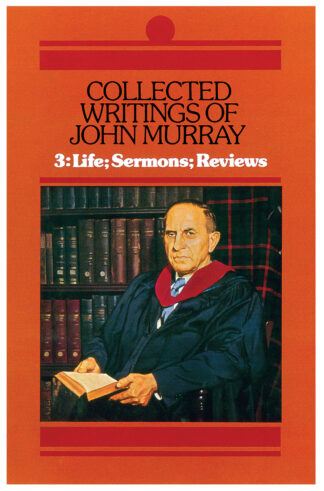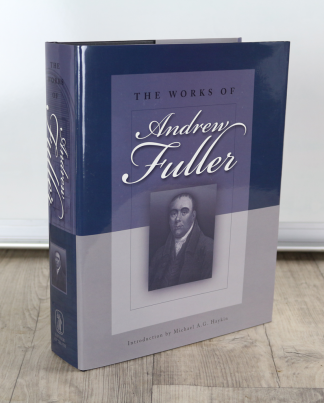The Works of Robert Traill
2 Volume Set
| Weight | 3.7 lbs |
|---|---|
| Dimensions | 8.8 × 5.75 × 3.1 in |
| ISBN | 9781848719859 |
| Binding | Cloth-bound, eBook (ePub & Mobi), Cloth-bound & eBook (ePub & Mobi) |
| Original Pub Date | 1810 |
| Banner Pub Date | May 27, 2020 |
| Page Count | 1,168 |
| Format | Book |
Book Description
Friend of William Guthrie of Fenwick, attendant of James Guthrie of Stirling on the scaffold, son of the Greyfriars Church manse where the 1638 National Covenant was signed, Scot ordained in England, exile in Holland, prisoner on the Bass Rock, scholar, preacher, and saint — Robert Traill lived to span the ripest period of the Puritan age. Distinguished in the classes of Edinburgh University, Traill early felt the inner constraint to preach Christ. Too intimate an association with the younger John Welsh drew the swift displeasure of the civil arm upon him. Denounced as a ‘Pentland Rebel’ he fled in 1667 to join the bright galaxy of British divines weathering the storm of Stuart absolutism in the Low Countries. Traill’s literary output began there. Assistant to Nethenus, professor at Utrecht, he prepared Samuel Rutherford’s Examination of Arminianism for the press. Back in London in 1692 he took up his pen, as Isaac Chauncy (Owen’s successor) and the younger Thomas Goodwin were having to do, to defend the doctrine of Justification against the new Legalism. After serving Presbyterian charges in Kent and London, he died at the age of 74.
Robert Traill was endowed with a first-class mind and had enjoyed a very complete theological education. Nevertheless, his sermons were not meant to appeal to the learned. He strove throughout to promote practical godliness. Every reader who shares his outlook will find him warm, instructive, and encouraging.
J. C. Ryle, who frequently quotes from Traill in his writings, introduces one lengthy extract with the words, ‘It has done me good and I think will do good to others.’
This edition contains ten additional sermons not included in the 1975 Banner of Truth edition, which are appended to volume 2.
‘I know no true religion but Christianity; no true Christianity but the doctrine of Christ— of his divine person; of his divine office; of his divine righteousness; and of his divine Spirit. I know no true ministers of Christ, but such as make it their business, in their calling, to commend Jesus Christ, in his saving fulness of grace and glory, to the faith and love of men; no true Christian, but one united to Christ by faith, and abiding in him by faith and love, unto the glorifying of the name of Jesus Christ, in the beauties of gospel-holiness.’
— Robert Traill in his Preface to Sermons Concerning the Throne of Grace (in vol. 1)
Table of Contents Expand ↓
| VOLUME 1 | ||
| A Letter from the late Mr James Hervey to a Relation of Mr Traill's | vii | |
| Recommendation to the Sermons on Stedfast Adherence | ix | |
| An Account of the Life and Character of the Author | xi | |
| The Throne of Grace: Thirteen Sermons on Hebrews 14:6 | 1 | |
| By What Means May Ministers Best Win Souls? A Sermon on 1 Timothy 4:16 | 211 | |
| A Vindication of the Protestant Doctrine concerning Justification, and of Its Preachers and Professors, from the Unjust Charge of Antinomianism | 229 | |
| Sermons concerning the Lord's Prayer: Sixteen Sermons on John 17:24 | 273 | |
| VOLUME 2 | ||
| Stedfast Adherence to the Profession of Our Faith, Recommended in Twenty-one Sermons, on Hebrews 10:21-24 | 1 | |
| Eleven Sermons on Important Subjects, from 1 Peter 1:1-4 | 253 | |
| Six Sermons on Galatians 2:21 | 397 | |
| A Letter from the Author to His Wife, and One to His Children | 471 | |
| Additional Sermons | 483 |
Related products

Collected Writings of John Murray
Volume 3: Life, Sermons, Reviews
Description
Book Description Friend of William Guthrie of Fenwick, attendant of James Guthrie of Stirling on the scaffold, son of the Greyfriars Church manse where the 1638 National Covenant was signed, Scot ordained in England, exile in Holland, prisoner on the Bass Rock, scholar, preacher, and saint — Robert Traill lived to span the ripest period […]

Description
Book Description Friend of William Guthrie of Fenwick, attendant of James Guthrie of Stirling on the scaffold, son of the Greyfriars Church manse where the 1638 National Covenant was signed, Scot ordained in England, exile in Holland, prisoner on the Bass Rock, scholar, preacher, and saint — Robert Traill lived to span the ripest period […]

Tracts and Letters of John Calvin
7 Volume Set
Description
Book Description Friend of William Guthrie of Fenwick, attendant of James Guthrie of Stirling on the scaffold, son of the Greyfriars Church manse where the 1638 National Covenant was signed, Scot ordained in England, exile in Holland, prisoner on the Bass Rock, scholar, preacher, and saint — Robert Traill lived to span the ripest period […]







Michael Veitch –
I purchased a used copy of the Banner’s 1975 edition last year, and cannot recommend Traill highly enough. As a pastor, I would say that the short essay in Volume 1 on “By what means may ministers best win souls?” is a ‘must read’ job description and biblical instruction manual for every minister. Delighted this set is being re-released.
MatteoB –
I am sure the Holy Spirit’s hand was at work in leading me to buy these two volumes. I am currently reading the sermons on Hebrews 4:16 on the throne of grace and they directly address problems that I have been having with prayer. Traill ia direct, warm and was obviously very caring of his congregation from the evidence of these books. Being a collection of sermons one can dip into the volumes or slowly read them right through as I am doing. I would certainly recommend these volumes especially if you like Brooks and Watson or even the wonderful Sinclair Ferguson as Traill has the same lively and warm style.
reagan_marsh –
The Works of Robert Traill: A Pastoral Review
By Reagan Marsh 1/21/21
According to Joel Beeke, the Scottish Presbyterian Robert Traill (1642-1716) “is linked to the best in the Scotch, Dutch, and English Puritan traditions.” The son of a pastor, he trained at Edinburgh, was mentored by William Guthrie, and edited Samuel Rutherford’s Examination of Arminianism before pastoring in Kent and London. His tone, content, and style are immediately reminiscent of William Marshall or Petrus van Mastrict: intelligent, accessible, doctrinal, and warmly Christ-centered.
In Banner’s new edition of The Works of Robert Traill, we are given his original four volumes presented in a lovely blue two-volume clothbound set, complemented by fresh, attractive dustjackets. The 1975 printing has long been unavailable, leaving readers little recourse outside of incomplete independent reissue efforts – until now. Ten additional sermons not previously included in the 1975 compilation finalize volume 2, offering an enriched engagement with Traill’s knowledge of Christ through this superb collection.
Here, we meet Traill the shepherd: his corpus is for God’s people, and his great care for souls is evident throughout. While displaying a quiet brilliance, he frequently focuses on the timeless themes of true conversion and the practical Christianity he terms ‘gospel-holiness.’ Though a scholar of the first rank, he directed his preaching for the benefit of regular folk, not the elite or intelligentsia. Godly wisdom – the fruit of confessional biblical reflection coupled with sincere experiential piety – fills these pages. He aimed to edify the Church, not impress the academy, which is why he was a favorite of J.C. Ryle. Representative of his concern for Christ’s sheep is his classic ‘By What Means May Ministers Best Win Souls?’ (I.213-27). Preached in October 1682, it skillfully examines pastoral theology in brief compass, demonstrating the robust biblical fidelity of the Puritan ministerial focus. Pastors and elders, whether just starting out or well-seasoned, are encouraged to give careful attention to this sermon.
We also meet Traill the theologian. Justification Vindicated (I.229-72), also published separately in Banner’s ‘Puritan Paperback’ series, presents a robust answer to Tobias Crisp’s antinomian errors while giving an excellent statement of the evangelical doctrine of Christ’s justifying work for sinners. Though differing with Thomas Boston on their respective views of the covenants (Boston was a two-covenant man, while Traill affirmed three; see I.310), this brief book became quite popular among the Marrow Men, and his work in it transcends the centuries. Concerning the Lord’s Prayer (I.273-543), an exemplary work of pastoral theology, gives sixteen beautiful sermons on John 17:24. Readers will be instructed and deeply encouraged by this exposition of the priestly ministry of Christ.
Finally, we meet Traill the Christian man. His godliness is sketched briefly in the opening ‘Account of the Life and Character of the Author’ (I.xi-xvi), while included letters to his wife (II.471-76) and children (II.477-81) provide a tender, personal glimpse of his concern for the wellbeing and spiritual life of his family. Steadfast Adherence (II.1-252) richly displays the sweet hope found in the Lord which so thoroughly marks Puritan literature; the glory and mercy of Christ shines through twenty-one discourses drawn from Hebrews 10, exhorting believers to hold firm to the truth as it is in Jesus. Sermons on Important Subjects (II.253-395) contributes a lovely treatment of 1 Peter 1:1-4, and six insightful expositions from Galatians 2:21 comprise Righteousness in Christ (II.397-469). These sermons are worth their weight in gold and are exceedingly precious. By the earnestness and piety displayed in these sermons, Traill is revealed as one thoroughly acquainted with the weight of his own sin, the fullness of grace in Christ, and the saint’s life of faith.
Banner is to be commended for reprinting this expanded edition of Traill’s Works. Highly recommended.
*Disclosure: I received these books at no charge in exchange for an unbiased review.
Richard C Ross –
This edition benefits greatly from having been retypeset. In the case of Robert Traill there is something more than superficially appropriate about that. It reflects the clarity of the author’s mode of expression and theological conception. Unlike a goodly number of his contemporaries, Robert Traill is neither wordy nor given to long meandering sentences. But he is ever bit as likely to touch your soul with wonderfully idiosyncratic turns of phrase. Here’s one that I hope will stick in my memory: ‘Never man had one mite of the grace of God, but he was saved by it’. (Vol 2, 412)